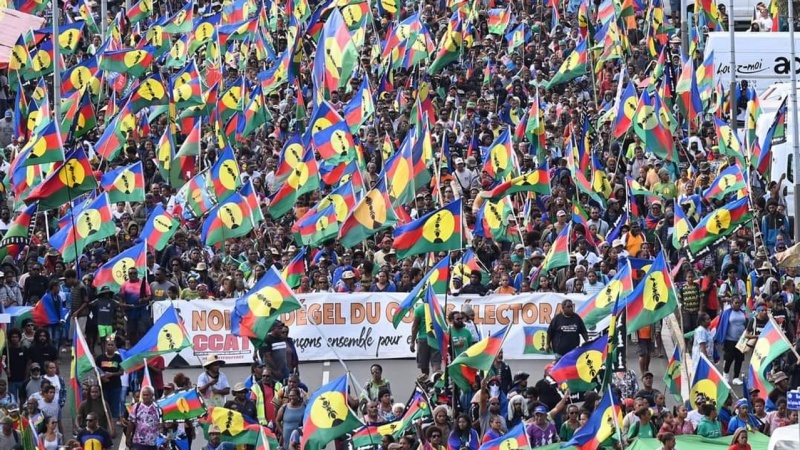The widespread protests in New Caledonia began recently after the French parliament approved changes to the electoral laws in the region, allowing French citizens who have lived in the territory for 10 years or more to vote.
Where is New Caledonia?
New Caledonia is one of five island territories in the Pacific Ocean under French control, rich in natural resources, and a key part of French President Emmanuel Macron's plan to increase Paris's influence in the Pacific.
This territory, with a population of over 300,000, is located between Australia and Fiji and is one of the largest overseas territories of France, a crucial part of Paris's claim to be a power in the Pacific. However, the indigenous Kanak people have long been dissatisfied with French colonialism and are seeking to change the status of their land.
In fact, after France occupied the territory in 1853, Paris deliberately populated it with French citizens. As a result, tensions over independence from France have been simmering in New Caledonia for a long time.
Why is New Caledonia important to France?
France, which has increasingly lost its influence in its former African colonies, sees maintaining a strong foothold in New Caledonia and other overseas territories in the Pacific as a key part of its broader strategy to maintain its sphere of influence in the region.
Paris considers the interests of French companies in maintaining a strong presence in the region, as well as access to important shipping lanes. At the same time, France sees itself as a balancing power in regulating tensions between China and the United States, particularly over Taiwan and the South China Sea, and with a permanent military presence in the region, it positions itself to respond in the event of a serious naval conflict.
Polynesia, Wallis and Futuna, and Clipperton are other French overseas territories in the Pacific, while Mayotte and Réunion are located in the Indian Ocean, with a population of 1.65 million.
The people of New Caledonia are protesting against France's expansionist policies aimed at changing the constitution in favor of this European country, and these deadly protests are on the rise.
Tensions have been ongoing for decades between the Kanak people seeking independence and the descendants of colonizers who want the country to remain part of France. The goal of the electoral changes was to increase the number of voters for the New Caledonia provincial elections, a move condemned by the pro-independence movement.
A senior sociology professor at a university said: "There is a sense of anger and injustice; there is also a fear of the Kanak population disappearing or being overwhelmed by other populations."
One of the leaders of the protests in New Caledonia believes that if there is violence in the country today, it is a response to the violence that has been imposed on this land since colonial times.
For the young people of New Caledonia, colonialism is not a thing of the past; they see France as the reason for their lost opportunities.
The intensity of the protests in New Caledonia, which has left several dead, led the French President to declare a state of emergency in the territory.
As mentioned, New Caledonia became a French colony in the 1860s; the first protest against French colonialism in 1878 resulted in the deaths of at least 800 people and the exile of thousands of Kanak; some indigenous tribes were also affected by this protest."
The promise of autonomy to New Caledonia was a promise that French officials always made, but all these promises ultimately led to the violent suppression of protests and demands.
In the end, France determined a 20-year decolonization process in 1998 through a signed agreement with New Caledonia, which was met with the support of the people of this land.
However, New Caledonia, rich in nickel, which could have been France's “El Dorado”, has now become a time bomb for Paris; New Caledonia holds 30% of the world's nickel reserves, a vital material in the production of stainless steel and electronic batteries.
According to the 2019 poll, more than 41% of New Caledonia's
population are Kanak, and 24% are European, with the first group facing
more economic and social problems, including lower wages and higher
poverty rates. The nickel deal between France and New Caledonia is seen
by the indigenous people as a colonial pact.
/129

